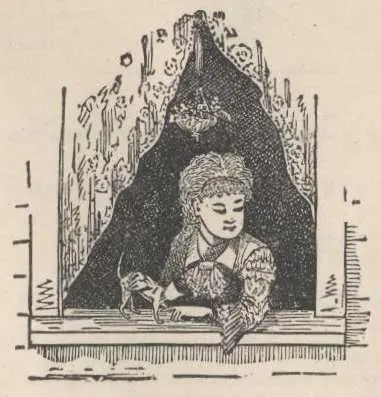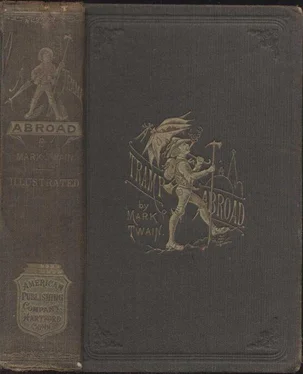Mark Twain - A Tramp Abroad
Здесь есть возможность читать онлайн «Mark Twain - A Tramp Abroad» весь текст электронной книги совершенно бесплатно (целиком полную версию без сокращений). В некоторых случаях можно слушать аудио, скачать через торрент в формате fb2 и присутствует краткое содержание. Жанр: Классическая проза, Юмористическая проза, на английском языке. Описание произведения, (предисловие) а так же отзывы посетителей доступны на портале библиотеки ЛибКат.
- Название:A Tramp Abroad
- Автор:
- Жанр:
- Год:неизвестен
- ISBN:нет данных
- Рейтинг книги:5 / 5. Голосов: 1
-
Избранное:Добавить в избранное
- Отзывы:
-
Ваша оценка:
- 100
- 1
- 2
- 3
- 4
- 5
A Tramp Abroad: краткое содержание, описание и аннотация
Предлагаем к чтению аннотацию, описание, краткое содержание или предисловие (зависит от того, что написал сам автор книги «A Tramp Abroad»). Если вы не нашли необходимую информацию о книге — напишите в комментариях, мы постараемся отыскать её.
A Tramp Abroad — читать онлайн бесплатно полную книгу (весь текст) целиком
Ниже представлен текст книги, разбитый по страницам. Система сохранения места последней прочитанной страницы, позволяет с удобством читать онлайн бесплатно книгу «A Tramp Abroad», без необходимости каждый раз заново искать на чём Вы остановились. Поставьте закладку, и сможете в любой момент перейти на страницу, на которой закончили чтение.
Интервал:
Закладка:
That experience has been of priceless value and benefit to me; for I resolved then, that as long as I lived I would never again rob a blind beggar-woman in a church; and I have always kept my word. The most permanent lessons in morals are those which come, not of booky teaching, but of experience.

CHAPTER XLVIII
Beauty of Women—and of Old Masters
In Milan—The Arcade—Incidents we Met With—The Pedlar—Children—The Honest Conductor—Heavy Stocks of Clothing—The Quarrelsome Italians—Great Smoke and Little Fire—The Cathedral—Style in Church—The Old Masters—Tintoretto's great Picture—Emotional Tourists—Basson's Famed Picture—The Hair Trunk
In Milan we spent most of our time in the vast and beautiful Arcade or Gallery, or whatever it is called. Blocks of tall new buildings of the most sumptuous sort, rich with decoration and graced with statues, the streets between these blocks roofed over with glass at a great height, the pavements all of smooth and variegated marble, arranged in tasteful patterns—little tables all over these marble streets, people sitting at them, eating, drinking, or smoking—crowds of other people strolling by—such is the Arcade. I should like to live in it all the time. The windows of the sumptuous restaurants stand open, and one breakfasts there and enjoys the passing show.
We wandered all over the town, enjoying whatever was going on in the streets. We took one omnibus ride, and as I did not speak Italian and could not ask the price, I held out some copper coins to the conductor, and he took two. Then he went and got his tariff card and showed me that he had taken only the right sum. So I made a note—Italian omnibus conductors do not cheat.
Near the Cathedral I saw another instance of probity. An old man was peddling dolls and toy fans. Two small American children bought fans, and one gave the old man a franc and three copper coins, and both started away; but they were called back, and the franc and one of the coppers were restored to them. Hence it is plain that in Italy, parties connected with the drama and the omnibus and the toy interests do not cheat.

The stocks of goods in the shops were not extensive, generally. In the vestibule of what seemed to be a clothing store, we saw eight or ten wooden dummies grouped together, clothed in woolen business suits and each marked with its price. One suit was marked forty-five francs—nine dollars. Harris stepped in and said he wanted a suit like that. Nothing easier: the old merchant dragged in the dummy, brushed him off with a broom, stripped him, and shipped the clothes to the hotel. He said he did not keep two suits of the same kind in stock, but manufactured a second when it was needed to reclothe the dummy.

In another quarter we found six Italians engaged in a violent quarrel. They danced fiercely about, gesticulating with their heads, their arms, their legs, their whole bodies; they would rush forward occasionally with a sudden access of passion and shake their fists in each other's very faces. We lost half an hour there, waiting to help cord up the dead, but they finally embraced each other affectionately, and the trouble was over. The episode was interesting, but we could not have afforded all the time to it if we had known nothing was going to come of it but a reconciliation. Note made—in Italy, people who quarrel cheat the spectator.
We had another disappointment afterward. We approached a deeply interested crowd, and in the midst of it found a fellow wildly chattering and gesticulating over a box on the ground which was covered with a piece of old blanket. Every little while he would bend down and take hold of the edge of the blanket with the extreme tips of his fingertips, as if to show there was no deception—chattering away all the while—but always, just as I was expecting to see a wonder feat of legerdemain, he would let go the blanket and rise to explain further. However, at last he uncovered the box and got out a spoon with a liquid in it, and held it fair and frankly around, for people to see that it was all right and he was taking no advantage—his chatter became more excited than ever. I supposed he was going to set fire to the liquid and swallow it, so I was greatly wrought up and interested. I got a cent ready in one hand and a florin in the other, intending to give him the former if he survived and the latter if he killed himself—for his loss would be my gain in a literary way, and I was willing to pay a fair price for the item —but this impostor ended his intensely moving performance by simply adding some powder to the liquid and polishing the spoon! Then he held it aloft, and he could not have shown a wilder exultation if he had achieved an immortal miracle. The crowd applauded in a gratified way, and it seemed to me that history speaks the truth when it says these children of the south are easily entertained.
We spent an impressive hour in the noble cathedral, where long shafts of tinted light were cleaving through the solemn dimness from the lofty windows and falling on a pillar here, a picture there, and a kneeling worshiper yonder. The organ was muttering, censers were swinging, candles were glinting on the distant altar and robed priests were filing silently past them; the scene was one to sweep all frivolous thoughts away and steep the soul in a holy calm. A trim young American lady paused a yard or two from me, fixed her eyes on the mellow sparks flecking the far-off altar, bent her head reverently a moment, then straightened up, kicked her train into the air with her heel, caught it deftly in her hand, and marched briskly out.

We visited the picture-galleries and the other regulation "sights" of Milan—not because I wanted to write about them again, but to see if I had learned anything in twelve years. I afterward visited the great galleries of Rome and Florence for the same purpose. I found I had learned one thing. When I wrote about the Old Masters before, I said the copies were better than the originals. That was a mistake of large dimensions. The Old Masters were still unpleasing to me, but they were truly divine contrasted with the copies. The copy is to the original as the pallid, smart, inane new wax-work group is to the vigorous, earnest, dignified group of living men and women whom it professes to duplicate. There is a mellow richness, a subdued color, in the old pictures, which is to the eye what muffled and mellowed sound is to the ear. That is the merit which is most loudly praised in the old picture, and is the one which the copy most conspicuously lacks, and which the copyist must not hope to compass. It was generally conceded by the artists with whom I talked, that that subdued splendor, that mellow richness, is imparted to the picture by AGE. Then why should we worship the Old Master for it, who didn't impart it, instead of worshiping Old Time, who did? Perhaps the picture was a clanging bell, until Time muffled it and sweetened it.

Интервал:
Закладка:
Похожие книги на «A Tramp Abroad»
Представляем Вашему вниманию похожие книги на «A Tramp Abroad» списком для выбора. Мы отобрали схожую по названию и смыслу литературу в надежде предоставить читателям больше вариантов отыскать новые, интересные, ещё непрочитанные произведения.
Обсуждение, отзывы о книге «A Tramp Abroad» и просто собственные мнения читателей. Оставьте ваши комментарии, напишите, что Вы думаете о произведении, его смысле или главных героях. Укажите что конкретно понравилось, а что нет, и почему Вы так считаете.












